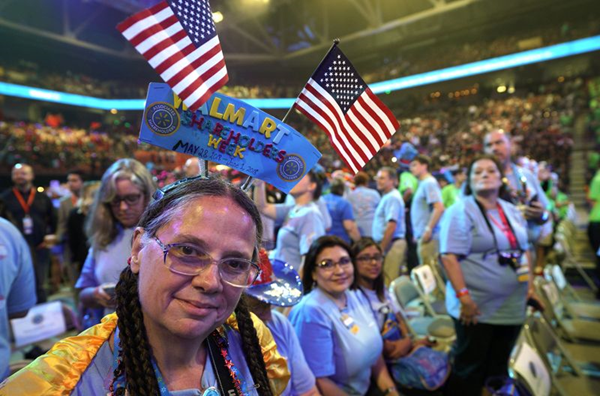Shareholder Meetings Pushed Online to
Avoid Covid-19
Investor activists have traditionally opposed corporate efforts to
drop in-person meetings, but the pandemic has changed all that.
By
Emily Chasan
and
Andrea Vittorio
March 17, 2020, 12:30 PM
EDT Corrected March 18, 2020, 4:57 PM EDT

Walmart
employees during an annual shareholders meeting event on June 1,
2018 in Fayetteville, Arkansas.
Photographer:
Rick T. Wilking/Getty Images North America |
Shareholder meetings are going virtual as companies adapt their
mandatory annual gatherings to the coronavirus.
Corporate proxy season is already underway, with companies filing
annual statements ahead of thousands of planned general meetings
stretching from April to July. Most firms are required by law to hold
gatherings to approve corporate policies. In recent years, meetings at
companies like Exxon Mobil Corp., Wells Fargo & Co. and Facebook Inc.
have become popular for activists urging action on climate change
and social responsibility.
But
the Covid-19 pandemic has changed all that. Citigroup Inc. and Bank of
America Corp. said
this week that they are considering alternative
arrangements for their meetings, and Starbucks Corp. will hold a
virtual annual
gathering on Wednesday instead of in a Seattle theater due
to “public health concerns.”
“We’re getting a lot of inquiries about contingency planning” due to
the coronavirus outbreak, said Chuck Callan, senior vice president for
regulatory and corporate affairs of proxy processor Broadridge
Financial Solutions Inc. Broadridge, which hosted a record number
of virtual annual meetings last year, said dozens of companies
are asking how to proceed.
The
U.S. Securities and Exchange Commission said Friday that
companies will be allowed to announce in regulatory filings that they
are conducting “virtual” shareholder meetings without sending out a
fresh proxy statement. Delaware law otherwise requires companies to
give 10-day advanced notice if they are changing their meeting
location, but the SEC said companies can now simply issue a press
release and post the information online.
And
it’s not just in the U.S. The Swiss
government said Monday that shareholders can have annual
general meetings with votes by proxy.
“One of the dangers of virtual meetings
is that companies can just cut out questions and not answer them.”
There are likely to be more regulatory moves in the coming weeks,
according to Callan. Nine U.S. states, including New York, technically
require companies to hold an annual meeting in person, sometimes in
addition to a virtual one. Broadridge said it hosted more than 300
online annual meetings last year, compared with just four when it
launched its virtual meeting platform in 2009.
Before the pandemic, shareholder advocacy groups often pushed back
against online meetings, saying they prevent them from having
face-to-face confrontations with company executives and their boards.
Shareholder activist John Chevedden asked investors
last year to vote against three directors
at
General Motors Corp. because of the company’s decision to hold an
online-only meeting. The long-time activist, who regularly submits
governance-related proposals calling for companies to split their
chairman and CEO roles or make it easier to remove directors, often
shows up to present his proposals directly to management and board
members.
Chevedden’s suggestion didn’t get enough votes to oust the directors,
and GM said that the new meeting format had ultimately increased
shareholder attendance to 125 from about 35 at its prior in-person
meetings.
New
York City Comptroller Scott Stringer, who oversees $216
billion in pension assets, has previously threatened to vote
against board members of companies that hold only online meetings.
Given the new reality of Covid-19, he says he won’t act against
companies that cite the virus and commit to holding future
in-person meetings.
“Public health must of course be a top priority,” Stringer said in a
statement to Bloomberg Law. Activists, in general, hope the online
trend will only be temporary.
“One
of the dangers of virtual meetings is that companies can just cut out
questions and not answer them,” said James McRitchie, a prominent
shareholder activist who submits dozens of proposals a year to
companies. He said he would still prefer a hybrid model, with some
portion of the meeting happening in public—or as close to public
as possible.
“Ideally, shareholders should be able to see and communicate with
other shareholders, even at a virtual meeting,” McRitchie said.
(Corrects
title of Broadridge executive in the fourth paragraph.)
©2020 Bloomberg L.P. All Rights Reserved
